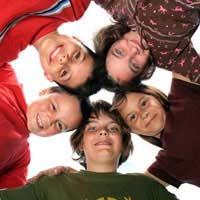Children's Rights in the UK and Abroad

Children's rights, or the rights due to every young person 17 years of age or younger, unfortunately need great protection under both national and international law. Sadly these rights have had to be enumerated in legal documents rather than being inherently observed by society, but today there is legal protection for children around the world. Unfortunately it can still be a daily struggle for children's rights to be observed a respected, but today there are many organisations fighting for children's rights both at home and abroad - and much that you can do to support these organisations and the protect the rights of children worldwide.
International Children's Rights
The United Nations Convention on the Rights of the Child (UNCRC) is the one international standard for the protection of children's rights around the world. This Convention was adopted by the United Nations in 1989, and came into force in 1992. The United Kingdom ratified this document in 1991, meaning that the government of the United Kingdom has been responsible for upholding the terms of this Convention in the United Kingdom since then. This document gives children over 40 specific social, economic, cultural/civil and political rights, and also contains information on how governments should enumerate and protect these rights. Today all but two eligible countries have ratified the Convention - the United States of America and Somalia. Responsibility for ensuring that countries follow the UNCRC rests with the Committee for the Rights of the Child, made up of international experts on the subject.Children's Rights and UK Law
Children's rights are protected by a variety of laws in the United Kingdom, including family law, education law and employment law. The United Nations Convention on the Rights of the Child (UNCRC) is also a basis for children's rights in the United Kingdom since the United Kingdom ratified this Convention and it is now in force. Legally this Convention is not binding, however it has become an international standard regarding children's rights and those countries who have signed and ratified it have committed themselves to establishing these rights at a national level. In the England, for example, the Children's Commissioner submits a yearly report to Parliament which discusses the rights of children in the country and the country's record regarding the UNCRC. In 2007 the United Kingdom conducted extensive research about both adult and child views of the UNCRC and the United Kingdom's promotion of the rights contained within it.Fighting for Children's Rights
UNICEF is the international children's charity that works for the implementation and protection of children's rights around the world. This organisation focuses on five major areas of concern. Child survival and development, basic education and gender equality and HIV/AIDS and children are all areas in which UNICEF makes a difference, as are child protection and policy advocacy and partnerships which it often works with at the organisational level. In order to monitor these areas, UNICEF engages in fundraising, research, purchasing and delivering supplies for children, providing life skills education, establishing health and development programmes and much more. In the United Kingdom, the Children's Rights Alliance for England, CROA - Children's Rights Officers and Advocates, Barnardo's, Childhope UK and Save the Children UK all work towards protecting children and children's rights. To become more involved with the fight for children's rights either at home or abroad, contact a registered children's charity and find out more about how you can make a difference.
Related Articles in the 'Human Rights' Category...


Re: Questionnaire: Experienced Discrimination School?
Good day! I am Reynalyn Joy A. Taylo, currently our research paper for Grade 12 as a HUMSS student.…
Re: Questionnaire: Experienced Discrimination School?
Good day! I am Reynalyn Joy A. Taylo, currently our research paper for Grade 12 as a HUMSS student.…
Re: Questionnaire: Experienced Discrimination School?
Hello, can we use your questionnaire for our research?
Re: High Profile Discrimination Cases
I work for a car rental company. I was sent to a airport to pick a vehicle up to bring back to my job site. I was stopped at…
Re: Questionnaire: Experienced Discrimination School?
Hello! Can we use these survey questions for our project?
Re: Questionnaire: Experienced Discrimination School?
Hello, can we are asking for your permission to use your questionnaire for our research? Thanks!
Re: Questionnaire: Experienced Discrimination School?
We are asking for your permission if we could copy some of your questionnaire for our research ?? Thank…
Re: Questionnaire: Experienced Discrimination School?
hello Good morning my name is Mico john Hernander 17 years old from manila. Im so happy to make comment…
Re: Your Rights in the Workplace
Senior management.. often scream and shout at the team. Things not investigated before the blame game starts. Staff behaviours…
Re: Your Rights in the Workplace
I work at M&S Distribution Centre in the East Midlands and only started working there since the beginning of May 2019, previously…